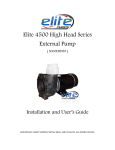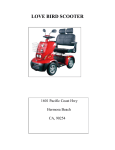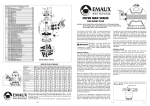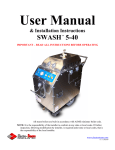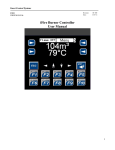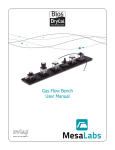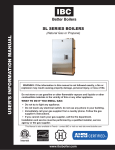Download Elite Primer 2 Series Pump External Pond Pump
Transcript
Elite Primer 2 Series Pump External Pond Pump ( Elite Primer Pro 2 High Flow, High Head, and Low RPM) Installation and User’s Guide IMPORTANT SAFETY INSTRUCTIONS, READ AND FOLLOW ALL INSTRUCTIONS. SAVE THESE INSTRUCTIONS **NEVER RUN PUMP DRY!! NEVER EXCEED 25psi INTERNAL CASE PRESSURE!! ***THIS PUMP IS ONLY TO BE USED AS AN EXTERNAL “OUT-OF-POND” PUMP. NEVER ALLOW PUMP TO BECOME SUBMERGED!! WIRING WARNING: RISK OF ELECTRICAL SHOCK OR ELECTROCUTION. This water garden pump must be installed by a licensed or certified electrician or a qualified water garden serviceman in accordance with the National Electrical Code and all applicable local codes and ordinances. Improper installation will create an electrical hazard which could result in death or damage to property. Always disconnect power to the water garden pump at the circuit breaker before servicing the pump. Failure to do so could result in death or serious injury to serviceman, water garden users or others due to electric shock. 1. Make sure all electrical breakers and switches are turned off before wiring motor. 2. Make sure that the wiring voltage matches the motor voltage (230v or 115v). If they do not match the motor will burn up. 3. Choose the correct wire size. When in doubt use a heavier gauge (larger diameter) wire. Heavier gauge will allow the motor to run cooler and more efficient. 4. Cut wires to the appropriate length so they don’t overlap or touch when connected to the terminal board. 5. Make sure all electrical connections are clean and tight. 6. Permanently ground the motor using the internal, green ground terminal located on the inside of the motor canopy or access plate. Use the correct wire size and type specified by National Electrical Code. Make sure the ground wire is connected to an electrical service ground. 7. Bond the motor to the water garden structure in accordance with the National Electrical Code. Use a solid No. 8 AWG or larger copper conductor. Run a wire from the brass external bonding clamp to the water garden bonding structure. 8. Connect the pump permanently to a circuit. Make sure no other lights or appliances are on the same circuit. NOTE: If the pump is installed below the water level of the water garden, close return and suction lines prior to opening hair and lint pot on pump. Make sure to reopen valves prior to operating. PUMP STRAINER BASKET This unit, sometimes referred to as the “Hair and Lint Pot”, is the unit in front of the volute. Inside the chamber is the basket which must be kept clean of leaves and debris at all times. View basket through the “See Through Lid” to inspect for leaves and debris. Regardless of the length of time between filter cleaning, it is most important to visually inspect the hair and lint pot basket at least once a week. A dirty basket will reduce the efficiency of the filter and heater and also put an abnormal stress on the pump motor which would result in a costly repair bill. WARNING: DO NOT open the strainer pot if pump fails to prime or if pump has been operating without water in the strainer pot. Pumps operated in these circumstances may experience a build up of vapor pressure and may contain scalding hot water. Opening the pump may cause serious personal injury. In order to avoid the possibility of personal injury, make sure the suction and discharge valves are open and strainer pot temperature is cool to touch, then with extreme caution. CAUTION: To prevent damage to the pump and filter and for proper operation of the system, clean pump strainer and skimmer baskets regularly. WARNING: THIS FILTER OPERATES UNDER HIGH PRESSURE. WHEN ANY PART OF THE CIRCULATION SYSTEM (e.g. LOCK RING, PUMP, FILTER, VALVES, ETC) IS SERVICED, AIR CAN ENTER THE SYSTEM AND BECOME PRESSURIZED. PRESSURIZED AIR CAN CAUSE THE LID TO BLOW OFF WHICH CAN RESULT IN SEVERE INJURY, DEATH, OR PROPERTY DAMAGE. TO AVOID THIS POTENTIAL HAZARD, FOLLOW THESE INSTRUCTIONS. 1. Turn off motor. 2. Relieve pressure in the system. 3. Turn the lid in a counter-clockwise direction until it stops. 4. Lift lid and remove basket. 5. Put the debris from the basket into the trash and rinse out the basket. If the basket is cracked, it should be replaced. 6. Replace the basket and fill the pump pot and volute up to the inlet port with water. 7. Clean the cover, O-ring and sealing surface of the pump pot. Grease the O-ring with Teflon or silicone. 8. Reinstall the lid. 9. Make sure the lid O-ring is properly placed. Seat the lid then turn clockwise until hand tight (DO NOT over tighten with tools) 10. Turn the power “ON” at the house circuit breaker. Reset the water garden time clock to the correct time. 11. Open the manual air relief valve on top of the filter. 12. Stand clear of the filter. Start the pump. 13. Bleed air from the filter until a steady stream of water comes out. Close the manual air relief valve. WINTERIZING If the air temperature drops below 35º F. the water in the pump can freeze and cause damage. Freeze damage is not warrantable. To prevent freeze damage follow the procedures listed below. 1. Shut off electrical power for the pump at the house circuit breaker. 2. Drain the water out of the pump case by removing the two drain plugs from the case. Store the plugs in the pump basket. 3. Cover the motor to protect it from severe rain, snow, and ice. 4. Do not wrap the motor in plastic. It will cause condensation and rust on the inside of the motor. CARE OF ELECTRIC MOTOR PROTECT FROM HEAT Shade the motor from the sun. Any enclosure must be well ventilated to prevent overheating. Provide ample cross ventilation. PROTECT AGAINST DIRT Protect from any foreign matter or splashing water. Do not store (or spill) water garden chemicals near the motor. Avoid sweeping or stirring up dust near the motor while it is operating. If a motor has been damaged by it voids the warranty. PROTECT AGAINST MOISTURE Protect from splashing water garden water. Protect from the weather. Protect from lawn sprinklers. If a motor has become wet – let it dry before operating. Do not allow the pump to operate if it has been flooded. If a motor has been damaged by water it voids the motor warranty. NOTE: DO NOT wrap motor with plastic or other air tight materials. The motor may be covered during a storm, for winter storage, etc., but NEVER when operating or expecting operation. WARNING: RISK OF ELECTRICAL SHOCK OR ELECTROCUTION. This water garden pump must be installed by a licensed or certified electrician or a qualified water garden serviceman in accordance with the National Electrical Code and all applicable local codes and ordinances. Improper installation will create an electrical hazard which could result in death or damage to property. Always disconnect power to the water garden pump at the circuit breaker before servicing the pump. Failure to do so could result in death or serious injury to serviceman, water garden users or others due to electric shock. WARNING: DO NOT open the strainer pot if pump fails to prime or if pump has been operating without water in the strainer pot. Pumps operated in these circumstances may experience a build up of vapor pressure and may contain scalding hot water. Opening the pump may cause serious personal injury. In order to avoid the possibility of personal injury, make sure the suction and discharge valves are open and strainer pot temperature is cool to touch, then with extreme caution. PUMP DISASSEMBLY CAUTION: Be sure not to scratch or mar the polished seal faces. Seal will leak if faces are damaged. All moving parts are located in rear sub-assembly of this pump. Tools required: 1/2 inch open end wrench 9/16 inch open end wrench Flat and Phillips head screwdrivers To remove and repair the motor sub-assembly perform the following procedures. 1. Turn off the pump circuit breaker at the main panel. 2. Drain the pump by removing the drain plugs. 3. Remove the 6 bolts that hold the main pump body (strainer pot/volute) to the rear subassembly. 4. GENTLY pull the two pump halves apart, removing the rear subassembly. 5. Remove the diffuser. 6. Remove the shaft cap located at the back of the motor and hold the shaft secure with a flathead screwdriver (Century) or 7/16 inch open-end wrench (Franklin) . 7. To unscrew the impeller from the shaft, twist the impeller counter clockwise. 8. Remove the four bolts from the seal plate to the motor, using a 9/16 inch wrench. 9. Place the seal plate face down on a flat surface and tap out the carbon/spring seal. 10. Clean the seal plate, seal housing, and motor shaft. PUMP REASSEMBLY / SEAL REPLACEMENT CAUTION: The polished and lapped faces of the seal could be damaged if not handled with care. 1. When installing the replacement ceramic/carbon seal, use silicone sealant on the metal portion, before pressing into the seal plate. 2. Before installing the ceramic section of the seal into the impeller, be sure the impeller is clean. Use a light density soap and water to clean the seal. Press the seal into the impeller with your thumbs and wipe off the ceramic and carbon faces with a clean cloth. 3. Remount the seal plate to the motor. 4. Screw the impeller onto the motor shaft. 5. Remount the diffuser onto the seal plate. 6. Grease the diffuser O-ring. 7. Assemble the motor sub-assembly to the strainer pot-pump body. DO NOT tighten down any of the bolts until all 6 bolts are in place and finger tight. 8. Fill the pump with water. 9. Reinstall the pump lid by turning clockwise until hand tight (DO NOT over tighten with tools). 10. Prime the system; see Priming the Pump. RESTARTING INSTRUCTIONS & PRIMING THE PUMP CAUTION: DO NOT run the pump dry. If the pump is run dry, the mechanical seal will be damaged and the pump will start leaking. If this occurs, the damaged seal must be replaced. ALWAYS maintain proper water level in your water garden. If the water level falls below the skimmer opening, the pump will draw air through the skimmer, losing the prime and causing the pump to run dry, resulting in a damaged seal. If the pump is installed below the water level of the water garden, close return and suction lines prior to opening hair and lint pot on pump. Make sure to re-open valves prior to operating. The pump strainer pot must be filled with water before the pump is initially started. Follow these steps to prime the pump. For 2-speed pumps: Pump should run on high-speed for priming. 1. Remove the pump lid. 2. Fill the pump strainer pot with water. 3. Reassemble the pump lid onto the strainer pot. The pump is now ready to prime. 4. Open the manual air relief valve on top of the filter, and stand clear of the filter. 5. Turn on the switch or time clock. 6. When water comes out of the manual air relief valve, close the valve. The system should now be free of air and circulating water to and from the water garden. NOTE: Self-priming pump may take up to 3 1/2 minutes to reach a lift height of 10 feet. TROUBLESHOOTING FAILURE OF PUMP 1. Pump will not prime, too much air. Remedy: a. Check suction piping and valve glands on all suction gate valves. b. Secure lid on pump strainer pot and make sure lid gasket is in place. c. Check water level to make sure skimmer is not drawing air. 2. Pump will not prime, not enough water. Remedy: a. Make sure suction lines, pump strainer, and pump volute are full of water. b. Make sure valve on suction line is working and open (some systems do not have valves). c. Check water level to make sure water is available through skimmer. REDUCED FLOW AND/OR HEAD 1. Air pockets or leaks in suction line. Remedy: a. See item 1a of this section above. 2. Clogged impeller. Remedy: a. Turn off electrical power to the pump. b. Remove the bolts holding the volute to the seal plate. c. Slide the motor and seal plate away from the volute. d. Remove the diffuser. e. Clean debris from impeller. If debris cannot be removed, complete the following steps: i. Remove left hand threaded bolt and gasket. ii. Remove, clean and reinstall impeller. iii. Reinstall left hand threaded bolt and gasket. f. Reinstall the diffuser and diffuser O-ring. g. Reinstall motor and seal plate into volute. h. Tighten bolts securely. 3. Pump strainer clogged. Remedy: a. Clean suction trap.









